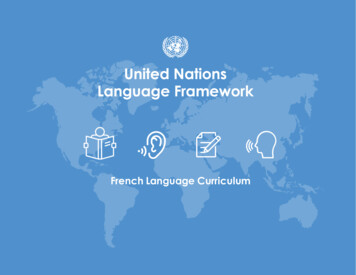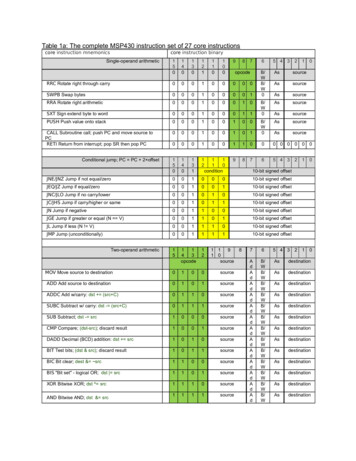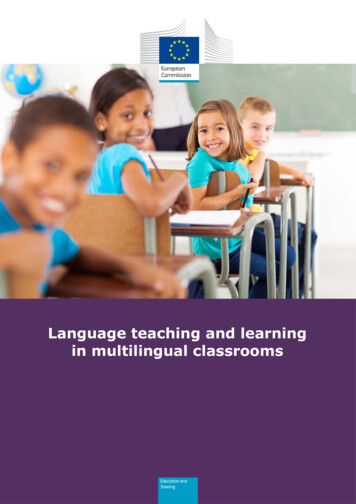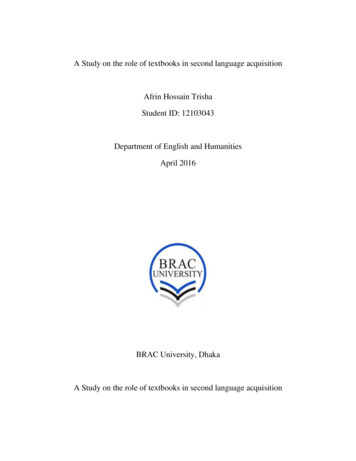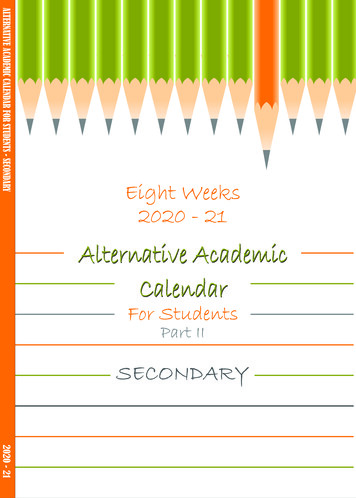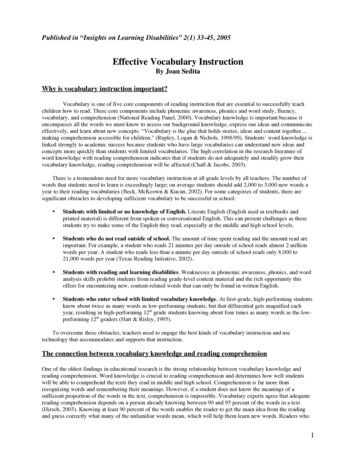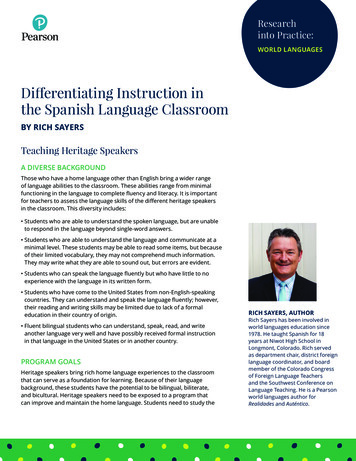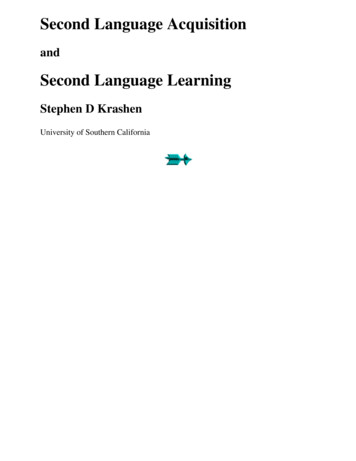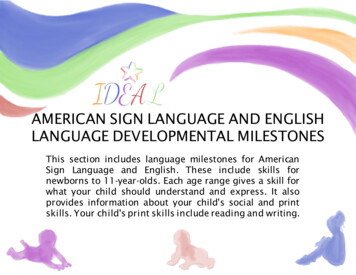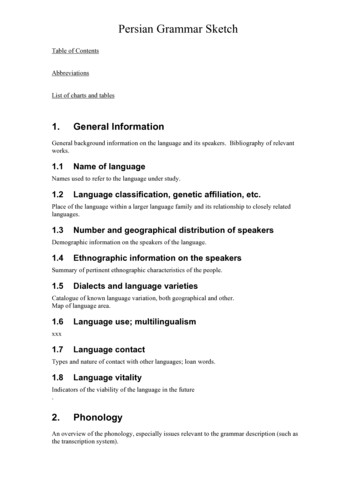
Transcription
Language of Instruction and InstructedLanguages in MauritiusGerda SonckUniversite Libre de Bruxelles, BelgiumMauritius is a multilingual country with English, French and Creole as the mainlanguages, and several ancestral languages which are mainly used for religiousceremonies. Most children speak Creole at home and learn English, French and oneancestral language in the first year of primary school. The educational dropout rate is40-50% after primary school. It is argued that the use of three languages in primaryschooling places too great a cognitive burden on children. Language policy ineducation needs to be revised on pedagogical and scientific rather than politicalgrounds. It is recommended that language be introduced into the curriculum atdifferent points in time.Keywords: multilingual education, educational policy and planning, education indeveloping countries, CreoleIntroductionMauritius is commonly better knov n for its beaches and its luxurious hotelsthan for its exceptional variety of races, religions, cultures and languages.Although this article deals with the linguistic situation in Mauritius in general,and more specifically with the importance of languages in the educationalsystem, it should be stressed that, particularly in Mauritius, such an analysis isinevitably linked with socioeconomic, political, cultural, psychological andreligious factors. Different cultures are present all over the island, in differentsocial layers of the population, and are partly maintained by means of thelanguages that are inherently linked with them. Indian languages such asHindi, Telegu, Marathi, Tamil, Urdu, Gujrati and Chinese languages such asMandarin, Hakka and Cantonese are part of the ancient cultures which wereintroduced in Mauritius by immigrant workers who started arriving in 1835when slaves were freed, while the importance of French and English is a resultof fhe colorual history of Mauritius (in the 18th century and 19th-20th century,respectively). Even economically speaking, Mauritius could be called complexbecause it finds itself at a cross-roads: although it is in many ways still adeveloping country, it is also developing fast towards modernisation andbecoming part of the western world, which adds to the importance ofEuropean languages.Mauritius is often cited as an example of a society in which many differentgroups live together in harmony. The island is, however, not exempt fromethnic conflict and even violence (Carroll & Carroll, 2000). Friction betweenethnic groups is particularly evident in language politics, especially in theeducational sector. In this paper, I will describe the overall linguistic situationin Mauritius and then examine the role of language instruction in the0143-4632/05/01 037-15 20.00/0J. OF MULTILINGUAL AND MULTICULTURAL DEVELOPMENT37 2005 G. SonckVol. 26, No. 1, 2005
38Journal of Mulfilingual and Muificuifural Developmenfeducational system. Based on my experiences living in Mauritius from 1996 to2000, on informal observations in preprimary and primary schools andrecordings of classroom instruction and of individual interviews withstudents, I argue that in Mauritius the five-year-old child is confronted withtoo many learning tasks at the same time, but that the political situation inMauritius keeps the government from changing the system. Yet to achievetheir potential in the world economy, significant changes to the role oflanguages in the educational system need to be made.Languages in MauritiusThe mother tongue of the majority of the islanders is Creole, the formervernacular of the African slaves who came to Mauritius as early as the 17thcentury (for more specific details about the origin of Mauritian Creole, seeSeuren, 1995). Creole languages are languages which have originated from aEuropean parent language in a colonial situation out of the need that peoplehaving a different LI have had to 'create' a common language to communicateamongst each other. The parent language of Mauritian Creole is French.However, from a morphological and S3mtactic perspective there are very fewsimilarities between the two languages. For example, whereas French has alarge number of flexions to indicate tense, aspect and mood, Mauritian Creolehas recourse to preverbal markers to express these. The situation is differentfrom the point of view of vocabulary, as Mauritian Creole tends to borrow a lotfrom French. It is the language currently spoken at home by 70% of the people(Population Census, 2000), but in reality the figure is probably higher as manydo not like to admit that Creole is their home language. Nowadays, Mauritiansfrom all layers of society speak Creole, but it is mainly used in informalsituations and for interethnic communication. Although in newspaper articlesand in some books, there is an attempt to reflect the spoken language on paper,the Creole in Mauritius is not a written language. There is no standard form ofthe language, which is probably a reason why the status of this language is stillvery low.Bhojpuri is also a spoken language in Mauritius. It is the home language of12% of the people (Population Census of Mauritius, 2000). This languagecame to Mauritius with migrant workers from India. Its roots lie in theBhojpuri spoken in Bihar in India, but it is now quite different fromthe original language. Bhojpuri used to be the main vernacular of the Indianpopulation, but it is slowly being replaced by Creole (still 20% Bhojpuri inthe Population Census of 1990 whereas only 12% in 2000). The mothertongue of most of the older Indian people in rural areas is Bhojpuri. Theirchildren are often bilingual Creole-Bhojpuri (about 50% of the population)while their grandchildren in most cases have no more than a passiveknowledge of the ancestral language. Like Creole, Bhojpuri is not an officiallanguage.French is the mother tongue of about 3% of the Mauritians. Many of these'Franco-Mauritians' are the descendants of French settlers who came toMauritius after 1721 and of the former sugarcane plantation owners. Theystill have economic power and they now also have investments in other
Languages and Education in Mauritius39economic sectors such as tourism. A large part of the population has someknowledge of French, the degree of knowledge varying widely fromindividual to individual. French is also the main language of the media (seeMiles, 1998a, about language mixing in the media).English is the language of government, the civil service, education, andof all formal and official transactions. The language was brought to the islandin 1814 when the British took over the administration although therewere hardly any English settlers. Many islanders have a very limitedknowledge of English, restricted to basic vocabulary and formulaic expressions (e.g. parents telling their child 'allez, shake hands' when meeting aforeigner). On the other hand, educated people are often able to write better inEnglish than in French. Generally, the higher the level of education anindividual has, the higher the level of proficiency in both English and French.At the university level, for example, most students have a very goodknowledge of English.English is sometimes spoken at home by some well-to-do Indian families aswell as by expatriates. There were some settlers of British origin in the 19thcentury but they have long ago been 'swallowed up' by the French speakers'community. Their origin might still be recognised in names such as 'Tenant','Lloyd' or 'Lincoln', names all pronounced in the French way. Whereas Englishis seen as the language of knowledge, French is associated with culturalactivities such as the theatre, movies and the media.Next to these four languages, there are about 10 eastern or 'ancestral'languages which nowadays have mainly a religious and cultural importance.In this paper, the general term 'ancestral languages' will be used for all theselanguages (for a finer distinction, see Tirvassen, 2002: 130-131).None of the above-mentioned languages fulfils all functions in Mauritiansociety (i.e. written and spoken, formal and informal, technical and cultural),which may be a reason why they have successfully coexisted for so long.Education and Languages: Historical OverviewDuring the French colonisation period, only a privileged group ofpeople had access to education. The language of education was the languageof the rulers, French, and those who could afford to do so, sent their childrento be educated in France. The slaves who served the French colonists spokeCreole and their children did not go to school as primary educationwas neither compulsory nor free (May & Woolard, 1997:141). After the arrivalof the British in 1810 and the Treaty of Paris in 1814, Mauritius became aBritish colony with English as the official language of the island. However, asfar as education was concerned, hardly anything changed. It was agreed thatthe population would keep their languages, habits and traditions (article VII ofthe Treaty). This caused no practical inconveniences as there were not thatmany British settlers. The British administration took pains not to provoke theFrench ruling class. Nonetheless, over the course of a century, English came tobe the language of education (see Stein, 1997, for an in depth discussion ofBritish colonisation in Mauritius).
40Jaurnal af Multilingual and Multicultural DevelapmentToday the following directive from the Education Ordinance of 1957 stillholds true:In the lower classes of Government and aided primary schools up to andincluding Standard III, any one language may be employed as thelanguage of instruction, being a language which in the opinion of theMinister is most suitable for the pupils.In Standards FV, V and VI of the Government and aided primaryschools the medium of instruction shall be English, and conversationbetween teacher and pupils shall be carried on in English; provided thatlessons in any other language taught in the school shall be carried onthrough the medium of that instruction.This paragraph written in 1957 was borrowed directly from the EducationOrdinance of 1944, and that in turn was a repetition of what had beenproposed at the beginning of the century. In the 1950s, however, the situationbegan to change dramatically: the former Indian immigrants (who hadbegun arriving after the abolition of slavery in 1830) started to play anincreasingly important political role. A result of this change in the politicalclimate was the 1955 introduction of ancestral languages into the educational system. State schools now offered each child the possibility of studyingthe language of his/her ancestors: Urdu, Hindi, Teiegu, Marathi, Gujrati,Tamil, Chinese, Arabic. These languages are symbolical and their use isrestricted to religious purposes. The government's stated aim was toprevent the loss of a rich cultural heritage (as had partly been the casewith the Creole people) and to strengthen ethnic identity, but the promotionof the ancestral languages cannot be dissociated from political motives.Next to the function of English and French at school, there has always beenthe question of the role of the mother tongue. During the first years afterindependence in 1968, the role of Creole in education became a major issue. Itis indeed the mother tongue of many children and a symbol for national unity,but it is on the other hand not backed up by a written environmental support(literature, press); it does not even have a standardised orthography and has avery low status. In Bissoonauth and Offord (2001: 395), examples are given ofpeople's attitudes towards Creole: English has the highest status; using Frenchalso gives a good impression; when one speaks Creole in a formal context, oneis looked down upon and ignored. However, one should take into account thatthese interviews were carried out with educated people (secondary schoolstudents and teachers), i.e. only a specific sample of the population. Debatesabout this subject became so emotional that the question has now been putaside. The point is far too sensitive and political parties prefer not to getinvolved. Creole is now spoken in all layers of society and by all ethnic groups,but it has not gained any economic or educational importance (for a detaileddescription of the role of Creole up until the beginning of the 1990s, see Foley,1992). Of course, the controversy has not come to an end and although it is notwithin the scope of this article to discuss in detail the pros and cons of the useof Creole in general, more will be said about the role of Creole in educationbelow.
Languages and Eduoatlon in Mauritius41Education and Languages: The Present SituationLanguage of instructionFor the first three years of primary education, there is no clear mandateconcerning the language to be used in the classroom. From the first yearonwards, school books are all in English, but the main spoicen languages areCreole and French. Mauritians generally do not consider Creole to be a'proper' language, but officially this attitude has changed: in February 1998,the Minister of Education declared that young school children should betaught in their mother tongue. However, this was not necessarily a popularmove. The Mauritians are very well aware of the international importance ofEnglish and French, and are also conscious of the fact that knowledge of theselanguages leads to social promotion. Many parents are therefore not in favourof the use of Creole at school. Some parents even start speaking French athome, once their children begin attending school (Tirvassen, 1993). Parents canexert a considerable amount of pressure on the school especially when they arewell off or highly educated. I have observed in the preprimary section of anEnglish-speaking private school (4-5-year-old children) that the parentsinsisted on the importance of learning French, while the children were stillhaving serious difficulty with English.Although, from the fourth year onwards, English is the official medium ofinstruction, what actually happens in the classroom varies widely from schoolto school. Asking students and teachers and observing classes does notnecessarily give a clear picture of the situation because teachers are reluctantto admit that they use Creole, and they avoid using it in the presence of'official' outsiders.''In some schools, Creole is not used at all. These are the few private schoolsto which expatriates send their children (English system or French system) andfees are high. No ancestral languages are taught either. Many private schoolsare confessional schools. In 2001, secondary private schools were still in themajority (3240 seats in state schools, 4200 seats in private schools for lower VI),but this will change as by 2006, 49 new secondary state schools will have beenbuilt (with a new total of 6220 seats for state schools). For more informationabout the reforms in secondary schools, see the report edited by the Ministryof Education and Scientific Research (Ending the Rat Race in Primary Educationand Breaking the Admission Bottlenecic at Secondary Level, 2001).Whatever will be officially decided or recommended with regard to the useof Creole at school, it does not look very likely that much will change in thenear future. Some teachers (and parents) try to avoid Creole; others will use itextensively to facilitate communication and teaching. For these reasons,French is also widely used in schools: it is a prestige language andcommunication in it is easier than in English. One thing is certain, the useof English in schools is much more restricted than what might be expectedwhen reading the Education Ordinance. This is not surprising as the childrenhave no previous knowledge of English before entering school and very oftenthe teachers' knowledge of English is not very extensive. Furthermore, Englishis not widely used in the child's environment. Before independence in 1968,
42Journal of Multilingual and Multicuitural Developmentthere were some English-speaking teachers (e.g. Irish nvms) in the schools butthese have all gone. The poor level of proficiency in English is now a viciouscircle (insufficient exposure and poor instruction leading to insufficientknowledge overall) that cannot be remedied by some governmental directive.Teaching of ianguagesFrom Year 1, English is used as the language of instruction, and is alsotaught as a subject. The distinction between the two in the classroom is,however, far from clear. In the private school where I carried out some of myresearch and where English is used as a medium of instruction, children doreceive explicit second language teaching. I observed lessons where thechildren were made familiar with thematic vocabulary (e.g. names of animals,how to express emotions, etc.). On the other hand, the teaching of the Englishlanguage in most Mauritian schools is often restricted to teaching isolated andfixed expressions ('Where do you live?') and is structure based rather thanoriented towards communication. During the lessons I observed in anotherschool the teacher pointed at a picture board and the children had to say theword aloud. Or the teacher asked 'Montrez-moi ou est le "ceiling"'. TheEnglish words were put in a Creole or French linguistic context such as in'Allez, shake hands maintenant'. It is doubtful whether the children understand even these simple expressions because I often got wrong answers suchas 'Curepipe' (a town in Mauritius) to the question 'What's your name?' or'Sangita' (name) to the question 'Where do you live?' (for information aboutthe content of the English textbooks used, see Foley, 1995).French as a subject is also introduced from Year 1 (five sessions a week). Insome preschools, it is often used as a means of communication. In secondaryschool, French as a subject becomes an option.Eastern or ancestral languages are an option from the first year of primaryschool (five sessions a week). About 70% of the children learn an ancestrallanguage; it is mainly Creole children who do not choose this option. For theCreole speakers, the connection with their own cultural past is not soprominent, although it can certainly be found in traditional sega-songs andsega-dancing.In summary, yj-om the start of the first year of primary school, all children learnEnglish and French at school and the majority learn an eastern language aswell. The teaching of languages occupies an exceptional place in primaryeducation in Mauritius. To illustrate this further, the number of teachersappointed for the different subjects are as follows: general purpose (GP) (English, French, mathematics, environmentalstudies (EVS)): 3539 teachers;' eastern languages (EL): 1488 teachers.A GP teacher teaches all of the four subjects while a teacher of EL onlyteaches the particular language he has been appointed to teach (data fromCommentaires sur le livre blanc du Ministere de I'Education, 1997: 12). Thediscrepancy between GP (including English and French) on the one hand andEL on the other hand, is obvious. About 30% of the teachers are appointed for
Languages and Educatian in Mauritius43the latter. This can be explained by the fact that GP lessons are administered toall children while EL are taught to ethnic groups. As a result, GP classes aretoo full, while ancestral language classes often have a small group of children,depending on the area and the ethnicity.Controversies Concerning Languages and EducationIn the classroomAs mentioned above, the languages currently used in the classroom are aserious matter of controversy. Indeed, opinions about the role of languages ineducation are such a sensitive issue that politicians try to avoid taking a firmposition. In September 1997, the Ministry of Education and Human ResourceDevelopment published a White Paper about the reform in Education. Onlyone paragraph was dedicated to languages and the content is illustrative of theevasive and obscure way the subject of languages is frequently dealt with:Language Policy is a very sensitive and very controversial issue; itarouses considerable passion and emotion. This is unfortunate Language must always foster Unity, not the contrary. We will not dojustice to our endeavour if we do not address the issue of a languagepolicy as a matter of urgency in an honest and sincere way. There is needfor a national consensus. It is proposed to update existing studies toestablish whether we need some flexibility in our medium of instructionat classroom level; and to what extent our present approach to languagesneeds to be revised to live up to our national aspirations. (Ministry ofEducation and Human Resource Development, 1997: 29)The main point of this controversy is the role of the children's mother tongue,Creole (and to a lesser extent Bhojpuri, the latter hardly ever beingmentioned), in the curriculum. Mother tongue education has undeniablesocial, linguistic, psychological and educational advantages, particularly whenteaching literacy and numeracy. This is why advocates like Skutnabb-Kangas(2000) proclaim that it is everyone's human right to be taught in the Ll. Thereare, however, multiple drawbacks to the teaching of Creole such as the lack ofa standardised form of the language, inadequate support for the writtenlanguage in the environment, and the attitude of the population towards theuse of Creole as a language of education (see Sonck, 2000).There is, on the other hand, a consensus about two major issues: English and French are internationally very important. It is essential thatthe children learn these languages in view of Mauritius' modernisationand economic development. Mauritius is proud of its cultural diversity. The different ethnic groupshave somehow managed to preserve their cultural and religious identity.The ancestral languages play an important role. In order to preventidentity loss, it should be possible for each child to study and learn thelanguage that is linked to his/her ancestral origin.
44Journal of Multilingual and Multicultural DevelopmentLanguages and the National Exam at thie End of PrimarySchoolThe role of the national examThe national exam which leads to the Certificate of PrimaryEducation (CPE) is administered at the end of primary school education, i.e.after six years. Until recently, pupils' CPE rankings determined which schoolhe/she will be sent to. There are large disparities between different schoolsin terms of quality, education, teacher training and infrastructural abilities,and the best candidates are sent to the schools with the best reputations. Somechildren are selected for schools that are practically at the other end of theisland, which can also lead to the termination of their education astheir parents may not be able to pay for transport. It must be noted that asof 2004, the ranking system has been replaced by a grading system whichshould enable more students to be enrolled in State Secondary Schools(Ministry of Education and Scientific Research, 2001). Whether these changeswill lead to improvements in the inequities in the educational system remainsto be seen.The children who do not pass the CPE exam have no other choice butto put an end to their school career. There is hardly any vocational ortechnical training, with the exception of the Hotel School in Reduit and theIndustrial and Vocational Training Board in Phoenix. Again, changes havebeen proposed for the future, but the main scope of this paper is the role oflanguages in the education system, primarily in primary school. No changesare foreseen in that area. Approximately 30-40% of 11-year-old childrenfail CPE each year (Ministry of Women, Family Welfare and ChildDevelopment, 1999, National Programme of Action Phase (Phase II) for theDevelopment and Protection of Children: 28). In some areas, the failure rate canbe as high as 90% (Roche Bois: Nicolay Government School and EmmanuelAnquetil Govt School, see Research Project carried out by the EuropeanCommission, 2000).It is not surprising that overall teaching is organised according to what isrequired to succeed for this high stakes exam. Almost all students rely onprivate tutoring to raise their chances for success; this also serves tosupplement the inadequate salary of teachers. Very poor students are at adistinct disadvantage.The role of languages in CPEThe questions of the CPE examinations are in English and the test materialsare printed in England. It is therefore indispensable that the participantsshould understand English, even for a mathematics exam. The role of Englishas a key to success is therefore undeniable, but knowledge of English is yetagain taken into account when marks are awarded for the different subjects.The importance of languages is striking:English: 3 points;French: 2 points;
Languages and Educafion in Maurifius45(Asian languages/Arabic as an option: 3 points);Mathematics: 3 points;EVS: 3 points.For decades, one of the main issues of the CPE (next to the ranking/gradingsystem mentioned above) has been the weighting of the ancestral languages. Ifthese languages are included in the grading system, then, once again, Creolechildren are at a disadvantage. Since January 2004, Oriental/Arabic languageshave been conferred the same status as all other examinable subjects for theCPE examination. Pupils who have not previously studied these languageshave been offered the possibility of free tuition outside normal school hours asof 2001.Evaluating the Role of Languages in Mauritian SchoolsThe discussion about languages in education in Mauritius can be elaboratedat length. There are cultural, social, economic, linguistic, psychological,political and other aspects to be considered. Here I will focus on the mostsalient points: English as the medium of instruction, French and ancestrallanguages as a subject.English as the language of instructionThe role of English as the official language of the country and language ofeducation has grown historically and politically (Stein, 1997). The largestgroup of Mauritians is of Indian descent (about 70% of the population) andthey are in favour of English as the official language and opposed to French.Unlike French, English is considered a 'neutral' language because it is notassociated with a particular ethnic group. English is also the language ofinternational trade, technology, commerce in the Indian Ocean; and essentialfor tourism (Crystal, 1997). Apart from these obvious reasons, acknowledgedby the Mauritian people, there are also technical reasons. Changing the officiallanguage would imply quite a financial investment. This would be the case forFrench, but even more so for the adoption of Creole as it is not a writtenlanguage and there is as yet no standard orthography.That being said, it is a fact that overall knowledge of English is relativelypoor. The low success rate at school (about 20% of the population is completelyilliterate (Education Card: Statistics: 2); 30-40% failure for the CPE) is alsopartly the result of nonlinguistic factors such as low income.The role of FrenchAlthough French is only taught as a subject in secondary school, the generallevel of proficiency in French is higher than is the case for English. Oftenmentioned as the most obvious reason for this discrepancy between Englishand French is the fact that French is much closer to Creole and therefore easierto acquire. French is the language of the media and it is substantially used(spoken and written) by a large number of people. French could be called a'second language' in Mauritius but I am reluctant to use this term for English.
46Journal of Mulfilingual and Muificuifural DeveiopmenfOne illustrative example from everyday life could be given: the film 'Titanic'was shown in many cinemas in Mauritius in 1997, but it was dubbed intoFrench, even in the capital. It should also be mentioned that the Frenchgoverrmient puts much more effort into promoting the French language inMauritius (e.g. Alliance fran aise) than the British government does forEnglish. For example, the headmaster of an important English-speakingprivate school expressed his disbelief to me when the British High Commission did not respond to his request for assistance in getting British booksdestined for education imported tax free. Promotion of the English language, itappears, is not one of their main missions. The French, on the other hand, offerFrench language courses at the Alliance fran aise, even in Rodrigues, a smallisland which belongs to Mauritius. The British Council does not organiselanguage courses but does offer a library, organises presentations by Britishspeakers, and arranges for some Mauritian students to study abroad.The special situation in Mauritius is not the fact that the language ofinstruction is not the same as most children's mother tongue, but that there is acompeting 'foreign' language that is more integrated into Mauritian daily life.Ancestral languagesAs noted above, instruction in nine ancestral languages is offered tostudents from the earliest grades. One may wonder whether the governmentof Mauritius can afford the teaching of all these languages at primary school.Moreover, it is far from certain that it is really the population's wish that theseancestral languages are taught at school. The parents who can afford it(including those who decide that EL should be part of the language teachingpackage offered at school) send their children to private schools or collegeswhere these 'ancestral' languages are not taught. They may familiarise theirchildren with these languages at a later age.Whereas Creole is the language that unites the nation, the role of theancestral languages in the educational system serves to divide the population.Mauritians always finds themselves being torn by the desire on the one handto be Mauritian and on the other hand to be a member of their ethniccommunity or a religion. Emphasising the ancestral languages at school andon the CPE exam adds another disadvantage t
Hindi, Telegu, Marathi, Tamil, Urdu, Gujrati and Chinese languages such as Mandarin, Hakka and Cantonese are part of the ancient cultures which were introduced in Mauritius by immigrant workers who started arriving in 1835 when slaves were freed, while the impo
